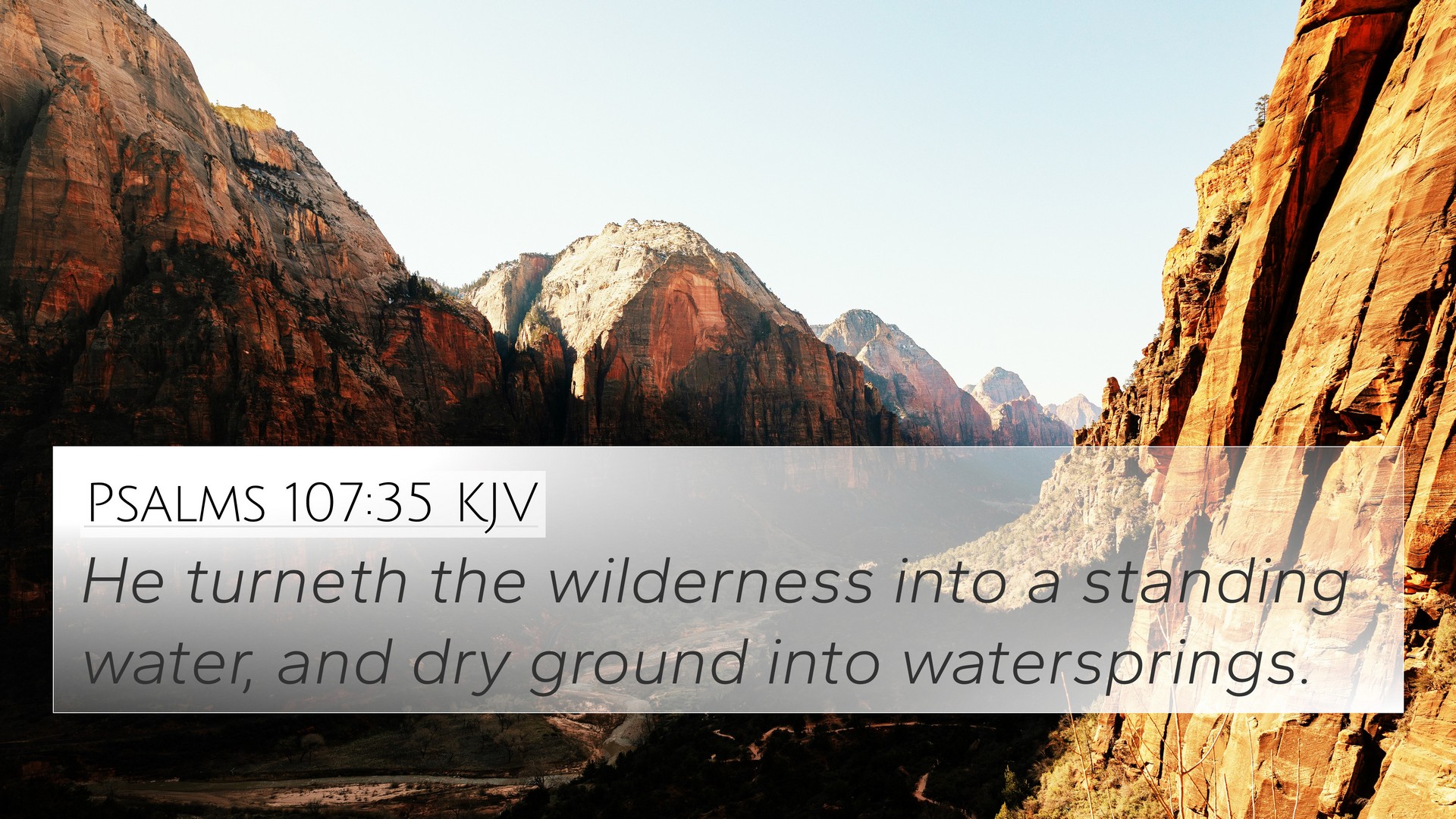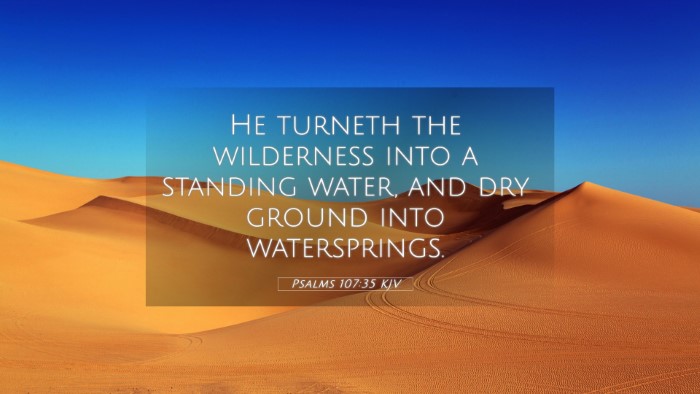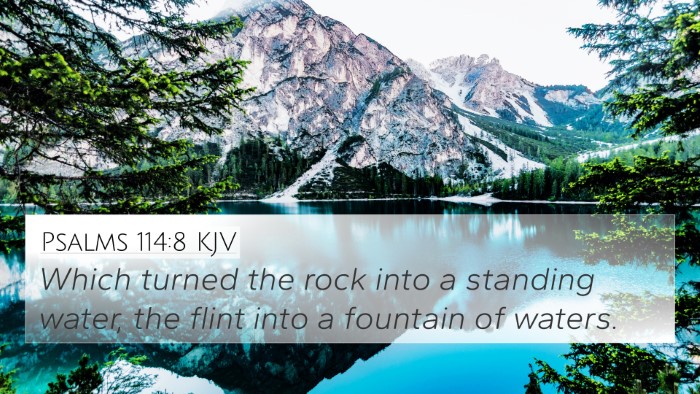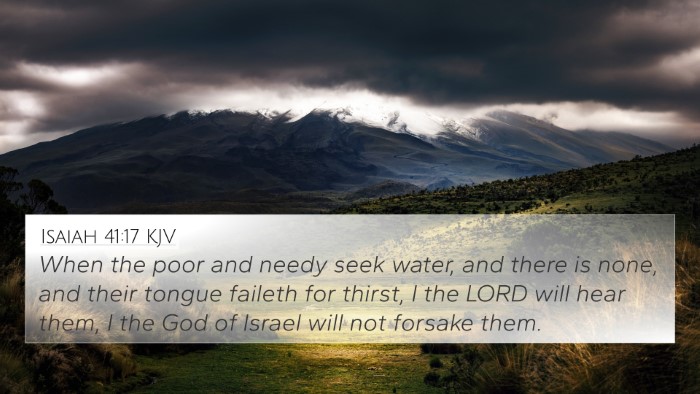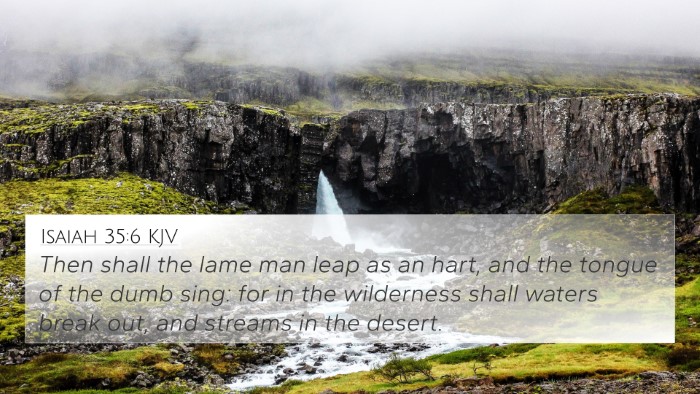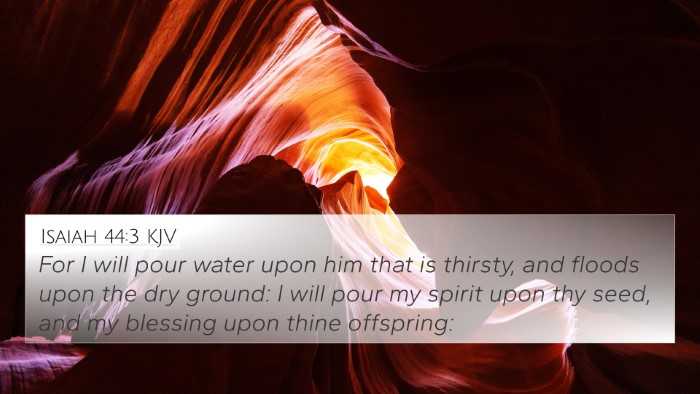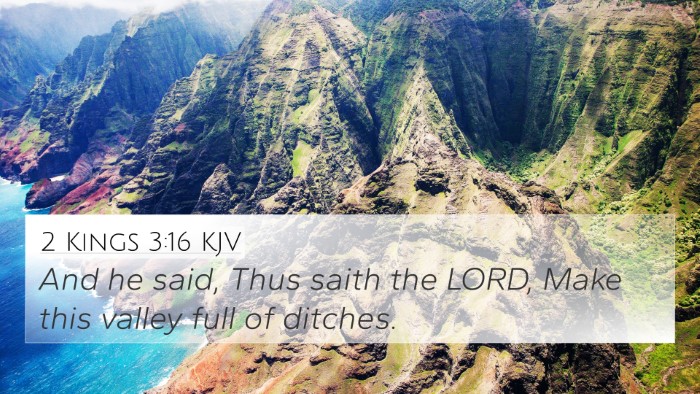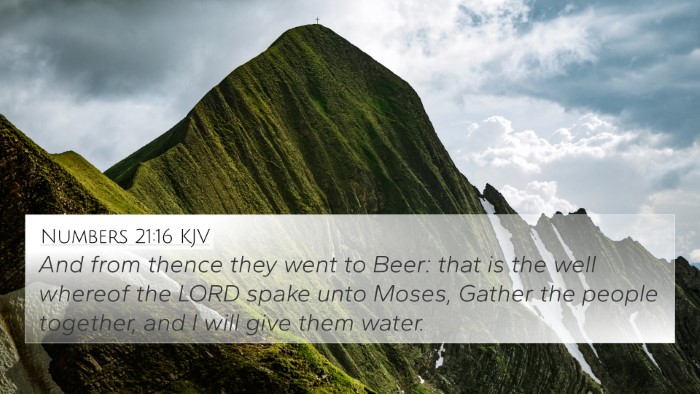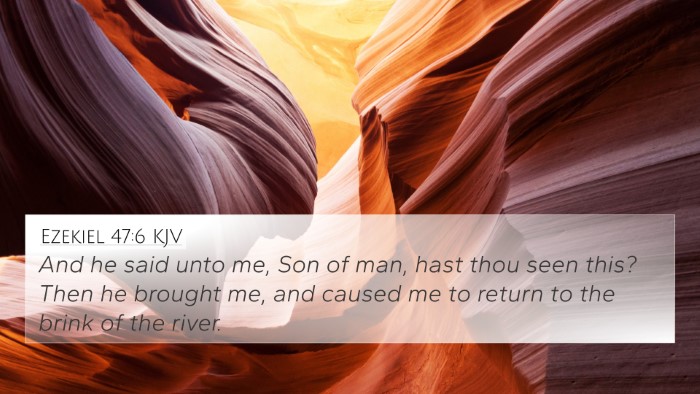Psalms 107:35 - Meaning and Interpretation
Bible Verse: Psalms 107:35 - "He turneth the wilderness into a standing water, and dry ground into watersprings."
This verse from the Book of Psalms is rich in meaning, emphasizing God’s transformational power in the natural world and, by extension, in the lives of His people. It reflects the themes of provision, divine intervention, and the restoration of life in places that seem desolate.
Summary of Insights from Public Domain Commentaries
Matthew Henry's Commentary
Matthew Henry explains that this verse illustrates God's sovereign ability to bring forth life and sustenance from barren places. The wilderness symbolizes spiritual desolation, while "standing water" and "watersprings" represent abundance and renewal. Henry emphasizes that just as God can convert literal wasteland into fruitful land, He can also rejuvenate the soul of a person who is spiritually dry.
Albert Barnes' Notes
Albert Barnes points to the miracle of divine provision displayed through nature. In his commentary, Barnes indicates that the transformation of dry ground into springs of water signifies hope and restoration. He also notes that this verse can serve as a metaphor for the spiritual refreshment God offers to those in distress and despair, reinforcing the idea of divine intervention in times of need.
Adam Clarke's Commentary
Adam Clarke highlights the contrast between wilderness and abundance, underscoring the role of God in changing circumstances. According to Clarke, this imagery invites readers to trust in God's capacity to alter their undesirable situations into fruitful ones. He further connects this verse to the overall theme of Psalms, where the faithful are reminded of God's continual mercy and help in their lives.
Connections to Other Bible Verses
Psalms 107:35 resonates with several other passages in the Scriptures, emphasizing similar themes of God's provision and miraculous works:
- Isaiah 41:18: "I will open rivers in high places, and fountains in the midst of the valleys: I will make the wilderness a pool of water, and the dry land springs of water." - This verse carries the same transformative theme of God providing abundance in dry places.
- John 4:14: "But whosoever drinketh of the water that I shall give him shall never thirst; but the water that I shall give him shall be in him a well of water springing up into everlasting life." - This highlights the spiritual sustenance found in Christ, paralleling the theme of life-giving water in Psalms 107:35.
- Jeremiah 17:8: "For he shall be as a tree planted by the waters, and that spreadeth out her roots by the river, and shall not see when heat cometh, but her leaf shall be green; and shall not be careful in the year of drought, neither shall cease from yielding fruit." - This metaphor emphasizes the stability and nourishment God provides, akin to the watersprings of Psalms 107:35.
- Revelation 7:17: "For the Lamb which is in the midst of the throne shall feed them, and shall lead them unto living fountains of waters: and God shall wipe away all tears from their eyes." - This ties the concept of spiritual nourishment provided by God to the eternal hope and restoration believers find in Him.
- Isaiah 43:19: "Behold, I will do a new thing; now it shall spring forth; shall ye not know it? I will even make a way in the wilderness, and rivers in the desert." - This verse parallels the idea of God creating pathways and new life where there seemed to be none.
- Psalm 1:3: "And he shall be like a tree planted by the rivers of water, that bringeth forth his fruit in his season; his leaf also shall not wither; and whatsoever he doeth shall prosper." - Reinforcing the nourishment of those aligned with God’s will, linking to the blessings implied in Psalms 107:35.
- Matthew 5:6: “Blessed are they which do hunger and thirst after righteousness: for they shall be filled.” - Reflecting the deep spiritual thirst that God satisfies, mirroring the physical transformation of nature described in Psalms 107:35.
- Psalm 126:4: "Turn again our captivity, O Lord, as the streams in the south." - This verse expresses a desire for restoration, similar to the transformation highlighted in Psalms 107:35.
- Job 5:25: "Thou shalt know also that thy seed shall be great, and thine offspring as the grass of the earth." - This assures God's provision and growth, connecting with the life-giving image in the Psalms.
Thematic Bible Verse Connections
The themes in Psalms 107:35 can also be contextualized within broader biblical narratives about restoration, God's providence, and the spiritual nourishment provided to His people. These themes recur throughout Scripture, teaching us about the transformative power of faith and God's promises:
- Restoration: From desolation to abundance, echoing the messages throughout prophets like Isaiah and Jeremiah.
- Divine Provision: Stories about manna in the wilderness (Exodus 16) reflect God's ability to provide for His people's needs.
- Hope and Faith: Biblical figures such as Moses and David experience God's provision in seemingly impossible situations.
- The Promise of Renewal: Concepts found in the New Testament showing Jesus as the fulfillment of Old Testament prophecies regarding restoration and spiritual nourishment.
- Community and Solitude: The Psalms often express both individual and communal experiences of God's faithfulness in times of trial.
Conclusion
Psalms 107:35 serves as a powerful reminder of God’s sovereignty and ability to bring forth life and abundance even from desolation. Through cross-referencing this verse with others throughout the Bible, we can deepen our understanding of the interconnectedness of Scripture and the overarching narrative of God's provision, restoration, and faithfulness. This verse invites believers to not only seek God in their spiritual thirst but also to recognize His hand in transforming the barren places of their lives into flourishing gardens of hope and sustenance.
